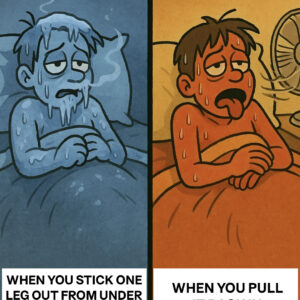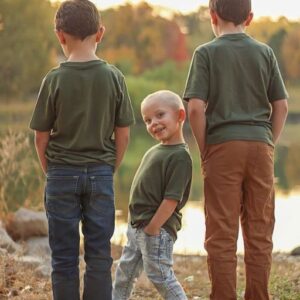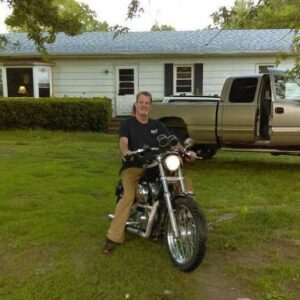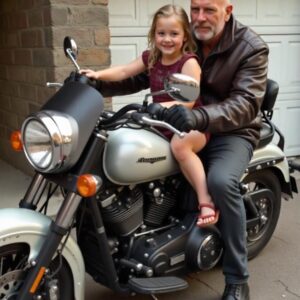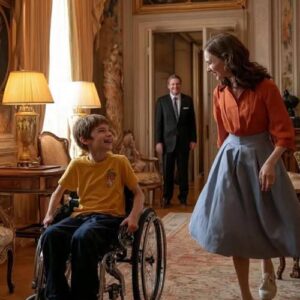
I was topping off the gas tank at a lonely rest area when a fully-grown biker—huge, tattooed, and wrapped in black leather—fell to his knees because my seven-year-old daughter placed her teddy bear in his hands. The sight of that mountain of a man crumbling on the hot pavement froze me in place. My first thought was to snatch Emma, jump back in the car, and speed away. What kind of scary stranger breaks down over a child’s toy?
Before I could act, the biker’s trembling fingers pulled a worn wallet from his pocket. Inside was a faded picture, the edges soft from years of handling. Once I looked at that photo, the mystery of all the teddy bears tied to truck grilles along Interstate 80 made perfect sense.
Other bikers stepped closer, forming a rough circle around their friend. Long beards, sunburned skin, leather vests dotted with patches—they looked like a wall of muscle and chrome. Yet there in the middle, Emma kept holding the man’s giant hand, as if she had known him forever.
She had marched right up to him and spoken six small words that shattered his guard: “You look sad. This helps me.”
I had planned a fast stop—gas, bathrooms, maybe an ice cream cone—on the long drive to our new life in Colorado. The divorce had left Emma clinging to her soft toys for comfort, so the back seat was stuffed with bears, bunnies, and cloth puppies. Promising her a break at the truck stop felt like a small gift after so many hard months.
The group of bikers was impossible to miss—two dozen gleaming motorcycles parked under bright lights. Every warning story my mother ever told about “biker gangs” echoed in my ears. I squeezed Emma’s hand and aimed straight for the store entrance. Emma, however, had another plan.
With sudden boldness, she slipped from my grip and strode toward the biggest rider in the lot. He sat alone on a low concrete block while his friends chatted nearby. I froze, heartbeat hammering, as my tiny girl approached that intimidating stranger.
“You look sad,” she said, holding out her well-loved teddy bear—a brown plush friend with one button eye, a scar of stitches on his belly, and fur rubbed thin from years of hugs. “This helps me when I’m sad.”
The biker’s vest read “Tank.” He stared at Emma as though her words came from another planet. Slowly—almost carefully—his enormous hand took the bear. He turned it over gently, as if afraid it might break.
“What’s this fellow’s name?” His voice sounded like gravel sliding down metal.
“Mr. Buttons,” Emma replied, proud as can be. “I fixed his tummy myself. Mommy showed me how.”
Tank’s shoulders quivered. A single hard breath escaped him. Then silent tears carved paths through the dust on his cheeks. The mighty rider slipped off the concrete, landed on his knees, and hugged the bear to his chest. That’s when he flipped open his wallet and showed us the photograph.
The picture displayed a little girl about five, pigtails bouncing, a gap-toothed grin beaming. She clutched a nearly identical brown teddy while standing beside a pink bike with training wheels.
“Lily,” Tank managed. “My daughter. She had one just like this.”
By now the other bikers had closed ranks, their faces tight with concern. A silver-haired woman knelt beside Emma and spoke softly, “Sweetheart, that was very kind. Tank’s little girl went to heaven last year. She loved teddy bears, too.”
Emma nodded, as though all of this fit perfectly in her world. “Mr. Buttons can stay with him,” she said. “He’s good at helping sad people.”
I found my voice at last. “Emma, honey, we should—”
“No,” Tank pleaded, eyes raw but steady on mine. “Please. Just a minute more?”
Every motherly alarm bell rang in my head, yet something in Tank’s broken expression made me pause. I gave a small nod.
Tank sat cross-legged on the hot asphalt to meet Emma eye to eye. “I’ve been riding from state to state,” he told her, “leaving teddy bears on trucks. Lily loved big trucks. She’d wave at every driver and make me honk back.”
“Why do you leave bears?” Emma asked.
“Because the truck that hit her—the driver was texting. Never even saw her bike.” Tank swallowed. “So I think, maybe if a trucker finds a bear, he’ll phone home, remember his own kids, and stay alert on the road. Every bear is a reminder to drive safe.”
A heavy silence fell. Even the highway noise dimmed. Emma studied him with serious eyes only children carry.
“That’s why you’re sad,” she said, more statement than question.
“Yes, little one. That’s why.”
Emma looked down at Mr. Buttons, then back at Tank. After a long moment she declared, “Mr. Buttons wants to help you leave more bears. He’s very good at important jobs.”
Whatever dam still held inside Tank burst. He folded Emma into a tender hug, huge arms shaking. “Thank you,” he whispered again and again.
The silver-haired biker—her name was Carol—rose and walked over to me. “Tank’s been on the road alone for months,” she explained. “We ride along behind him, keeping an eye out, but he won’t let anyone close. Your daughter just broke through the wall he built.”
I could only say, “I’m so sorry for your loss,” knowing the words were too small.
“Your child gave him more relief than any therapist,” Carol answered.
Tank let go of Emma, wiped his face, and stood. “Where are you headed?” he asked.
“Denver,” I told him. “New job. Fresh start.”
He nodded with purpose. “Carol, radio the crew. We’re escorting these ladies to Denver.”
“Oh, that’s not—” I began, but he raised a gentle hand.
“Ma’am, your daughter handed me the first piece of peace I’ve felt in a year. Let us return the kindness. Besides,” he said, looking at Emma, “how about a motorcycle parade?”
Emma’s eyes shone like sunrise. “Really?”
“Really.”
So our little Honda rolled toward Denver surrounded by thirty roaring bikes. Riders flanked us front and rear, engines rumbling like protective lions. Tank led the way with Mr. Buttons tucked safely in his saddlebag.
Before leaving the truck stop, Tank insisted on buying Emma a replacement toy. She chose a small stuffed motorcycle instead of another bear. “So I remember you,” she told him. His eyes watered again, but he held it together.
At the Colorado border they pulled off for final hugs. Every biker signed Emma’s new toy with a marker, turning it into a quilt of names and short messages. Tank knelt once more beside her.
“Know what you taught me today?” he asked.
Emma shook her head.
“You showed me Lily is still out here. In every kind act, in every bear. In kids brave enough to help strangers.” He unclipped a small pin from his vest—an image of a teddy riding a motorcycle. “This was Lily’s. Keep it for her, will you?”
Emma accepted it like precious treasure.
Tank handed me a simple business card before we parted. “If you ever need help—flat tire, rough day—call. The brotherhood looks out for friends.” On the card I read the group’s name: “Lily’s Bears—Road Safety Through Remembrance.”
“You turned hurt into hope,” I told him.
“Your girl reminded me how,” he replied. “Sometimes darkness feels endless, but a child’s light can still break through.”
Six months passed. Emma and I settled into a small Denver apartment. I juggled a new job while she adjusted to a new school. Life felt steadier, though still strange without the familiar routines of our old town and the unified home we used to share.
One chilly afternoon a package landed on our doorstep—no return address, only a Wyoming postmark. Inside we found a newspaper clipping headlined: “Teddy Bear Campaign Drops Trucking Accidents 30% on I-80.” The article told how Tank’s one-man mission had turned into a nationwide movement. Truckers were calling home more often, pledging not to text behind the wheel, even joining rides to place bears on each other’s rigs.
Below the article lay a handwritten note:
“Emma—Mr. Buttons has traveled through eighteen states and helped place over one thousand bears. Drivers send photos of their kids with the bears they find. You started this. Lives are safer because of you. Lily would have adored you. —Tank
P.S. Tell your mom thanks for trusting a rough-looking stranger.”
Also inside was a photo of Tank receiving an award at an event. Mr. Buttons sat proudly on the podium next to him. Emma insisted we frame it for the living-room wall.
A year zipped by. Heading to visit family for Christmas, we found ourselves back on I-80. At a familiar-looking rest stop, Emma spotted a cluster of motorcycles gleaming under winter sunshine.
“Mom! It’s Tank!” she squealed and bolted from the car. Tank turned, recognized her instantly, and his weathered face broke into the warmest smile. He lifted her, spinning while fellow riders clapped and cheered.
We spent only thirty minutes together, yet the reunion felt like a homecoming. Tank introduced Emma to new volunteers, showed us a binder full of bear photographs and thank-you letters. One note from a truck driver read: “Picked up bear in Nevada. Called my daughter for the first time in two years. Thank you.”
Before we parted, Tank pulled me aside. “I was set on ending my life the day your little girl stepped in,” he said quietly. “Had the route, the cliff, everything planned. Then Emma handed over her bear, and suddenly I remembered my reason to stay: turn pain into purpose.”
His words left me shaken but grateful. I hugged him hard. “Emma changed you,” I whispered.
“She saved me,” he agreed. “And every bear we fit to a truck keeps on saving.”
We kept in touch. Emma became the unofficial ambassador for Lily’s Bears, speaking at school assemblies about kindness and safe driving. Tank mailed regular updates addressed to “Mr. Buttons’ Mom and Sister.”
By Emma’s high-school graduation, Tank rode in with ten members to cheer for her. His beard had more gray, his walk a bit slower, but his eyes held calm purpose rather than raw grief.
“Lily would have graduated this year too,” he murmured as Emma accepted her diploma. “I like to imagine they’d be friends.”
“They are friends,” I answered. “Just in another way.”
Emma chose to study social work at college, focusing on helping children handle loss. Throughout her four years she kept Tank’s teddy-on-a-motorcycle pin on her backpack, a small badge of shared mission.
During her senior year we got the call: Tank had died of a heart attack while riding a stretch of highway he loved. He had always said he hoped to leave the world on two wheels under a wide sky—and that is what happened.
At his funeral, hundreds of bikers filled the lot. Even more touching, lines of eighteen-wheel trucks rolled in, air horns sounding a low, respectful note. Each truck wore a teddy bear on the front grill.
Emma spoke at the service. She stood next to a large poster of Tank holding Mr. Buttons.
“He taught me grief can spark goodness,” she said, voice steady though tears shone in her eyes. “The love we have for those no longer here can be shared with the living. Every bear on a truck, every safer mile traveled, every child making it home because a parent put the phone down—that is love refusing to fade.”
Today Lily’s Bears keeps rolling, led by Carol and the original crew. Mr. Buttons sits in a glass case at their headquarters—a small, worn symbol with one button eye and a heart full of miles.
Now and then I still drive I-80. When I spot a teddy bear zip-tied to a passing rig, I smile and think of a chain reaction that began with one brave child and a single act of kindness.
I picture Emma at seven, marching toward a fearsome biker because she sensed his hurt and trusted her teddy bear could mend it. She was right. Children often are about the truly important things. They see beyond leather, size, and tattoos to the aching heart underneath, and they act without second-guessing.
Thank goodness for that innocence. Thank goodness for Emma. Thank goodness for Mr. Buttons.
And thank goodness for Tank, who proved that gigantic men with roaring bikes can carry the gentlest souls; who turned his darkest hour into a light for others; who never forgot the little girl who taught him hope can begin with something as simple as sharing a teddy bear on a lonely highway.
